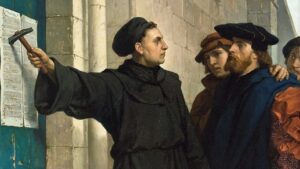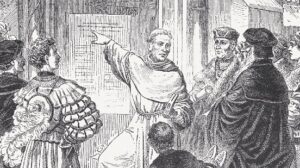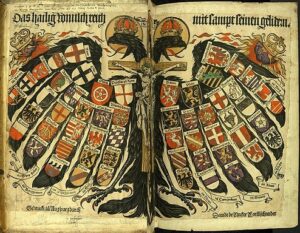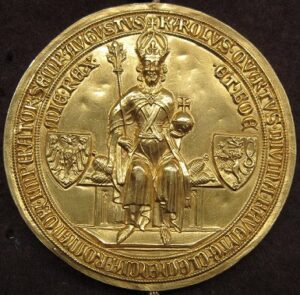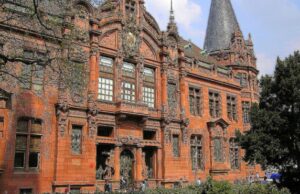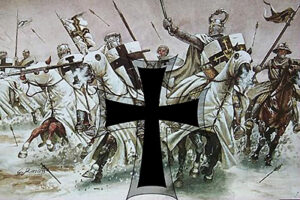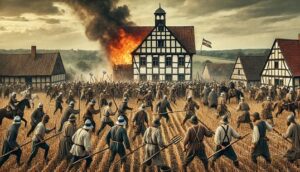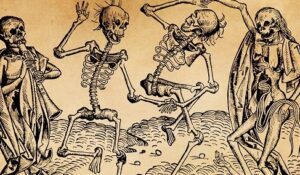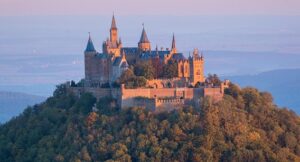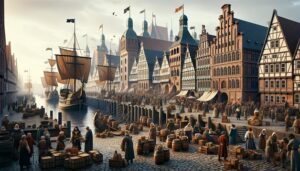Did you know that a simple act of nailing 95 theses to a church door sparked a cultural earthquake that reshaped Europe? Welcome to the German Reformation and Early Modern Period, where fiery sermons, printing presses, and princely politics changed the world. This category explores the transformative age that redefined religion, statehood, and … [Read more...]
Martin Luther and the 95 Theses
It’s October 31, 1517. A monk named Martin Luther, hammer in hand, walks to the door of the Castle Church in Wittenberg. In a single act, he nails a list of 95 arguments - against the abuse of indulgences and Church corruption - to the door. He’s not seeking to start a revolution. But within months, Germany is ablaze with debate. Luther’s 95 … [Read more...]
The Holy Roman Empire in the Late Middle Ages
By the 14th and 15th centuries, the Holy Roman Empire was no longer the centralized dream of Charlemagne. Instead, it had evolved into a sprawling collection of kingdoms, duchies, bishoprics, free cities, and principalities—each fiercely guarding its independence while still pledging some form of loyalty to the emperor. This period, often … [Read more...]
The Golden Bull of 1356
In the heart of the 14th century, amid feudal rivalries and imperial disputes, a single document aimed to bring order to the chaos. Issued by Emperor Charles IV, the Golden Bull of 1356 didn’t just organize a political process—it laid the groundwork for the structure of the Holy Roman Empire that would endure until the 19th century. Often called … [Read more...]
German Medieval Universities
Before there were libraries, lecture halls, and research labs, there were cloisters, candlelight, and quills. In medieval Germany, the pursuit of knowledge took root in an unexpected place—monasteries and cathedral schools—and eventually blossomed into universities that still stand today. During the Middle Ages, education evolved from a strictly … [Read more...]
The Teutonic Knights and Eastern Expansion
Crosses on shields. Swords in hand. Cloaks fluttering behind rows of disciplined knights. In the snowy forests and Baltic frontiers, the Teutonic Knights carved out a unique role in medieval German history—not just as warriors, but as agents of empire. What began as a humble hospital order during the Crusades became one of the most powerful and … [Read more...]
Peasant Revolts in the Middle Ages
When we think of medieval Germany, we often picture armored knights, towering castles, and devout monks. But far below the ramparts, in the fields and villages, lived a class with little wealth but immense numbers: the peasants. And while many were obedient and resilient, others rebelled—sometimes violently—against the crushing weight of taxes, … [Read more...]
The Black Death and Its Impact on Germany
In the mid-14th century, death swept across Europe with horrifying speed. Streets emptied, towns fell silent, and entire communities vanished. This was the Black Death, the deadliest pandemic in European history—and Germany, then a patchwork of feudal territories within the Holy Roman Empire, was hit hard. The plague didn’t just decimate the … [Read more...]
German Castles and Medieval Architecture
Towering spires. Crenellated walls. Hidden passageways and towering gates. Whether perched atop rocky cliffs or nestled in dense forest, German castles have long captured the imagination of visitors and historians alike. But these aren’t just romantic ruins—they're powerful symbols of the medieval past. In medieval Germany, architecture was more … [Read more...]
The Rise of the Hanseatic League
Picture a medieval German merchant ship—its hull full of grain, furs, and salted fish—sailing toward a bustling port on the North Sea. On shore, a trading hall bearing the insignia of the Hanseatic League awaits. This wasn’t just a commercial transaction. It was part of a network that shaped the economy, diplomacy, and identity of northern … [Read more...]
